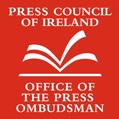Two pieces in yesterday’s Irish Times caught my eye. The first relates to the retirement of the man who has probably the most recognised signature in Ireland. The second relates to the responsibility of those who write other words that many of us read.
 For the past six years, every movie released in Ireland has been classified by his office with a certificate signed by him. He is John Kelleher, and he has just retired as Director of the Irish Film Classification Office:
For the past six years, every movie released in Ireland has been classified by his office with a certificate signed by him. He is John Kelleher, and he has just retired as Director of the Irish Film Classification Office:
‘I don’t believe in censoring for adults’
He’s seen nearly 2,000 films personally and supervised the watching of 55,000 others, yet the film censor John Kelleher only banned one film. Mr Kelleher, the director of the Irish Film Classification Office (Ifco), stepped down yesterday just two days short of his 65th birthday. …
He says his biggest achievement in office was to be involved in last year’s Civil Law (Miscellaneous Provisions) Act, which changed the name from the Irish Film Censor’s Office to the [the Irish Film Classification Office] Ifco. The Act changed his job title to reflect his primary role in classifying rather than censoring films. The phrase “likely to cause harm to children” was introduced into the legislation for the first time. [He said:]
I don’t believe in film censoring for adults, I believe in film classification for minors. I hope that people realised that I was trying to ensure that adults could look after themselves, that it was the welfare of children which was paramount
 Established in 2007, the Office of the Press Ombudsman is part of a system of independent regulation for the printed media in Ireland which provides the public with a quick, fair and free method of resolving any complaints they may have in relation to newspapers and periodicals. Prof John Horgan is the Press Ombudsman and he spoke yesterday of the responsibilities of reporters and editors to the their readers:
Established in 2007, the Office of the Press Ombudsman is part of a system of independent regulation for the printed media in Ireland which provides the public with a quick, fair and free method of resolving any complaints they may have in relation to newspapers and periodicals. Prof John Horgan is the Press Ombudsman and he spoke yesterday of the responsibilities of reporters and editors to the their readers:
Press ombudsman stresses duty of journalists to their readers
The credibility of the media is best defended by journalists who recognise that their loyalty to their readers is at least as important as their loyalty to their employers, the Press Ombudsman, John Horgan, has said.
The licence to print is now ultimately granted by the public and can be withdrawn if credibility, reliability, fairness or honesty was put at risk, he warned. “Credibility is like an iceberg: once it melts, it is impossible to reconstitute it.
Prof Horgan, who was speaking at the launch of a memoir by former Irish Times journalist Dennis Kennedy, said journalists were paid to exercise best judgment, though this could be elusive. Editors could find on occasion that such judgment could put them at odds with advertisers or owners, and journalists could find themselves at odds with editors. …
2 Reply to “Film classification and press regulation”